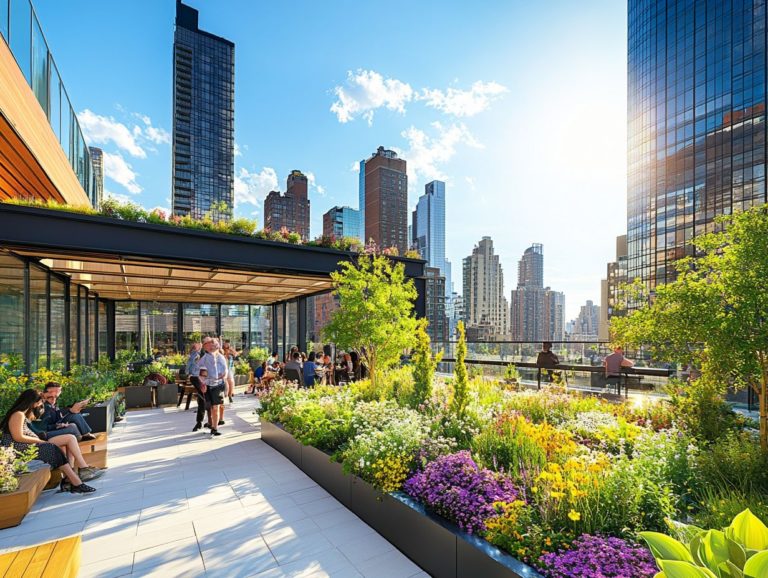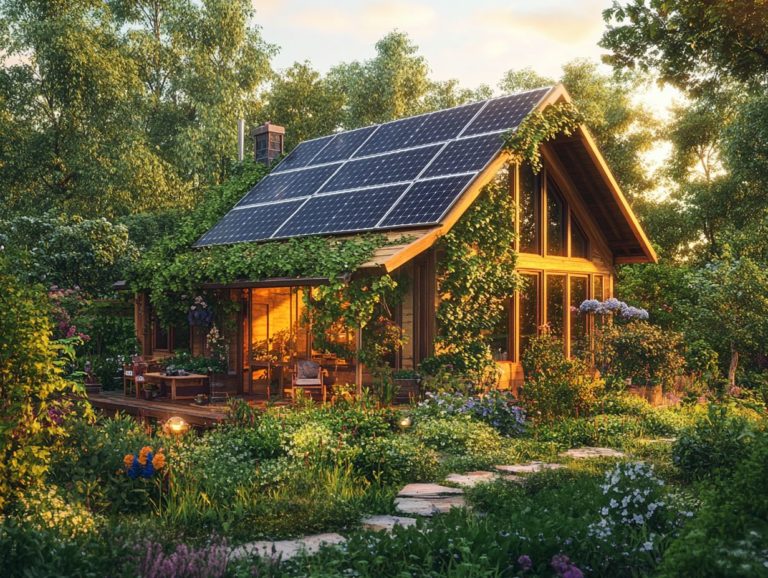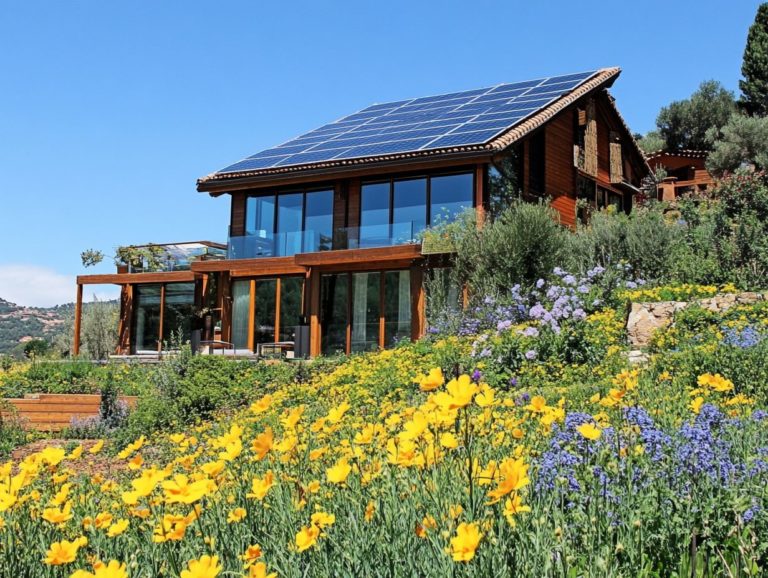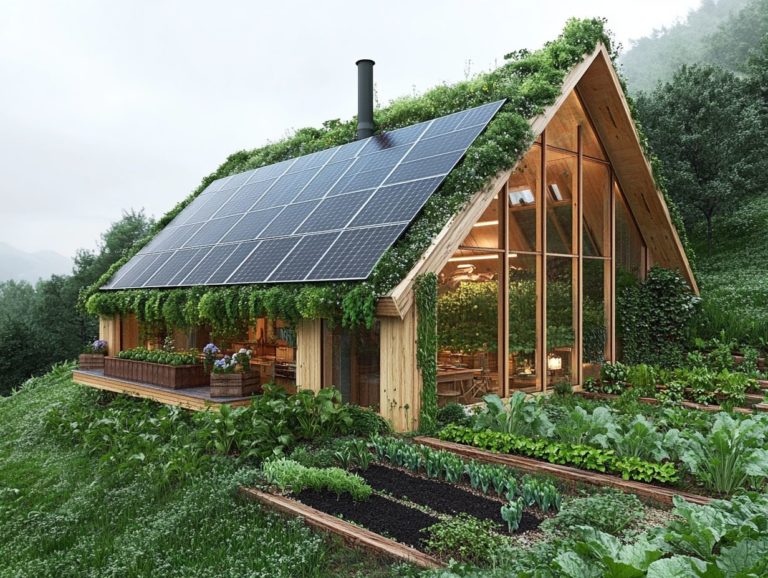5 Essential Eco-Friendly Hotel Features
In an era where sustainability takes center stage, hotels are stepping up to make a positive impact on the environment.
With energy-efficient lighting and eco-friendly amenities, the hospitality industry is embracing innovative practices that conserve resources while enhancing guest experiences. You won t believe how much energy you can save!
This article delves into five essential eco-friendly features that hotels can implement, the myriad benefits of these sustainable practices, and how you, as a guest, can actively participate in this movement.
Discover how hotels are transforming into not just places to rest your head, but also as champions of the planet. Let s dive into the exciting world of eco-friendly hotel features!
Contents
- Key Takeaways:
- 1. Energy-Efficient Lighting
- 2. Water Conservation Measures
- 3. Use of Sustainable Materials
- 4. Recycling and Waste Management Programs
- 5. Eco-Friendly Amenities and Practices
- How Can Hotels Become More Eco-Friendly?
- What Are the Benefits of Implementing Eco-Friendly Features in Hotels?
- How Can Guests Contribute to Sustainable Practices in Hotels?
- What Are the Challenges of Implementing Eco-Friendly Features in Hotels?
- What Are Some Successful Examples of Eco-Friendly Hotels?
- How Can Hotels Educate and Encourage Guests to Be More Eco-Friendly?
- Frequently Asked Questions
- What are the 5 essential eco-friendly hotel features?
- How does energy efficiency contribute to an eco-friendly hotel?
- What steps can a hotel take to promote water conservation?
- How does waste reduction play a role in an eco-friendly hotel?
- What are sustainable materials and how are they used in eco-friendly hotels?
- What are some examples of green amenities offered by eco-friendly hotels?
Key Takeaways:

- Implementing energy-efficient lighting can significantly reduce a hotel’s carbon footprint and save on energy costs.
- Water-saving devices help conserve a precious resource and save on water expenses for hotels.
- Using sustainable materials, such as bamboo or recycled materials, showcases a hotel’s commitment to environmentally friendly practices.
1. Energy-Efficient Lighting
Energy-efficient lighting is a crucial element in your goal of being sustainable within the hospitality industry. By adopting these solutions, you can significantly reduce energy consumption while appealing to eco-conscious travelers who seek out environmentally friendly hotels.
Among the various options available, LED lights truly shine they last a long time and use much less energy compared to traditional incandescent bulbs. Smart lighting systems, which can be programmed or adjusted remotely, enhance energy efficiency by ensuring that lights are only on when needed, thereby minimizing waste even further.
Renowned hotels like the Hilton Garden Inn and the Marriott have embraced these advanced lighting technologies, demonstrating their commitment to sustainability and offering guests a greener experience. Integrating energy-efficient options helps contribute to broader green initiatives, reduce operational costs, and meet the rising demand for environmentally responsible practices in the market.
Now, let s explore how conserving water can enhance your hotel s sustainability.
2. Water Conservation Measures
Water conservation measures are essential for sustainable hotels, protecting this vital resource and elevating your commitment to reducing environmental impact through innovative technologies and eco-friendly practices.
By incorporating water-saving devices and smart shower systems, you can significantly cut down on water consumption while ensuring an exceptional guest experience. Educating both your staff and guests about responsible water usage cultivates a culture of sustainability that reaches far beyond your hotel s walls.
When individuals grasp the significance of their actions, they are more inclined to adopt habits like limiting shower time and promptly reporting leaks.
These collective efforts align with your sustainability goals and foster a sense of environmental awareness, encouraging guests to carry these mindful practices into their own lives.
3. Use of Sustainable Materials
The use of sustainable materials in hotel construction and operations is essential for you to reduce plastic waste and elevate the overall eco-friendliness of the hospitality industry. This reflects a strong responsibility to the community and environment, while also promoting sustainable tourism.
By incorporating materials like recycled steel and bamboo, you can significantly lower your carbon footprint and create a more sustainable infrastructure. Recycled steel not only repurposes waste but also boasts remarkable durability, making it an excellent choice for structures built to last. Bamboo, celebrated for its rapid growth and renewability, provides an appealing aesthetic that harmonizes beautifully with nature.
Utilizing biodegradable products in your hospitality operations can minimize harmful contributions to landfills, proving that eco-friendly practices not only protect the environment but can also enhance guest experiences through thoughtful design and sustainable service offerings.
Join the movement for a greener planet today by supporting hotels that prioritize sustainability!
4. Recycling and Waste Management Programs

Implementing robust recycling and waste management programs is vital for you if you’re running a sustainable hotel. By cutting food waste and caring for the environment, you pave the way for green certifications that can significantly elevate your reputation in the hospitality industry. This includes establishing efficient recycling programs that encourage both staff and guests to participate actively.
Such initiatives not only tackle urgent environmental challenges but also appeal to eco-conscious travelers. These guests increasingly seek accommodations committed to sustainability.
Consider the many hotels that have embraced comprehensive composting systems specifically designed for food waste, effectively diverting organic material from landfills.
Initiatives that reduce plastic waste, such as eliminating single-use plastics and incorporating refillable dispensers, further showcase your commitment to a greener future. Successful programs, exemplified by renowned hotel chains, reveal that investing in sustainable practices can lead to tangible reductions in waste output while simultaneously boosting guest satisfaction and loyalty. Understanding what makes a hotel eco-friendly is essential for fostering these positive changes.
5. Eco-Friendly Amenities and Practices
Providing eco-friendly options is becoming increasingly vital for you as a sustainable hotelier. Attracting eco-conscious consumers while showcasing your commitment to being eco-friendly through thoughtful guest services is essential.
Consider investing in reusable items like stainless steel water bottles and cloth shopping bags to reduce single-use plastics and encourage your guests to adopt greener habits. Additionally, providing biodegradable toiletries allows you to minimize environmental impact without sacrificing quality. For those looking to enhance their eco-conscious travel, check out the 5 most eco-friendly hotels in Europe.
Sustainable dining options, sourced from local farms and featuring seasonal ingredients, not only elevate the culinary experience but also support local economies. By integrating these eco-friendly offerings, you enhance your guests’ overall experience and position your hotel favorably in a competitive market that increasingly values sustainability.
How Can Hotels Become More Eco-Friendly?
Hotels have a unique opportunity to become more eco-friendly by adopting sustainable practices that significantly reduce their carbon footprint and make a positive impact on the environment. This shift aligns perfectly with the rising demand for eco-conscious hotels and responsible tourism, responding to the needs of eco-conscious consumers.
To achieve this, implement green initiatives, such as energy-efficient lighting and water conservation systems, to dramatically reduce resource consumption. Training your staff on eco-friendly practices can further amplify these efforts, ensuring that every team member plays an active role in meeting sustainability goals.
Team up with local businesses to make a bigger impact! This strategy not only allows you to source locally and support community initiatives but also promotes environmental stewardship. Being responsible boosts your hotel’s reputation and builds guest loyalty, as more travelers are drawn to accommodations that reflect their values.
What Are the Benefits of Implementing Eco-Friendly Features in Hotels?
Implementing eco-friendly features in your hotel offers fantastic benefits! It boosts guest satisfaction and achieves significant cost savings through energy efficiency. Additionally, you can earn prestigious green certifications that elevate your brand image.
These initiatives attract environmentally conscious travelers and cultivate enhanced guest loyalty. Guests who value sustainability are eager to return to establishments that reflect their principles. To learn more about this, check out how to choose an eco-friendly hotel. Take, for example, the Hilton Group, which experienced a remarkable surge in loyal patrons after rolling out energy-saving technologies and waste reduction initiatives across its locations.
By optimizing running costs through smart energy management, you can redirect resources to enhance guest experiences. This creates an inviting atmosphere that sparks positive reviews and fuels organic marketing. The Fairmont Hotels & Resorts chain serves as a prime example, showing that embracing sustainability leads to thriving business outcomes while protecting our planet.
How Can Guests Contribute to Sustainable Practices in Hotels?

Guests play a pivotal role in advancing sustainable practices within hotels. By actively engaging in initiatives designed to reduce waste and minimize their environmental footprint, they support eco-friendly accommodations during their stay.
To amplify their positive impact, consider bringing along reusable items like water bottles, coffee cups, and shopping bags. This simple choice significantly reduces reliance on single-use plastics. It s also beneficial to inquire about any recycling programs offered at your accommodation. Participating in these efforts can positively influence the surrounding community.
Being conscious of energy consumption also makes a difference. Remember to switch off lights and unplug devices when they re not in use. Practicing water conservation during showers is an effective measure that is easy to adopt.
Embrace these collaborative actions to bolster hotel sustainability initiatives and contribute to a broader movement toward eco-conscious living!
What Are the Challenges of Implementing Eco-Friendly Features in Hotels?
Implementing eco-friendly features in hotels brings benefits, but it s not without challenges. You ll face increased initial operational costs, the necessity for extensive staff training, and possible resistance from guests who aren t accustomed to sustainable practices.
These hurdles can understandably make hotel management hesitant to fully invest in sustainability, especially when financial constraints limit the budget for upgrades or training programs. To navigate these challenges, explore partnerships with local green businesses, which might provide cost-effective solutions or incentives for adopting sustainable products.
Investing in employee education is vital. A well-informed staff enhances the guest experience and effectively communicates the value of your eco-friendly initiatives. For instance, hosting workshops and demonstrations empowers your team to articulate the benefits of these features, encouraging guests to embrace and support sustainable practices.
What Are Some Successful Examples of Eco-Friendly Hotels?
Numerous successful eco-friendly hotels showcase innovative practices that minimize their environmental footprint and serve as inspiring models for the broader hospitality industry eager to embrace green certifications and practices.
Take the Proximity Hotel in Greensboro, North Carolina. It’s celebrated for its solar panels and extensive use of recycled materials, proudly holding a LEED Platinum certification, which indicates a building’s environmental performance. Another example is The Brando in French Polynesia, recognized for its impressive carbon-neutral initiatives, including a seawater air-conditioning system. For more inspiration on eco-friendly travel, consider exploring the 5 most scenic eco-friendly destinations.
These hotels raise the standard and create blueprints for how other establishments can seamlessly weave eco-friendly measures into their operations. By prioritizing sustainable practices like sourcing local produce and conserving water, hotels can significantly contribute to environmental preservation while appealing to eco-conscious travelers.
Join the movement towards sustainability today!
How Can Hotels Educate and Encourage Guests to Be More Eco-Friendly?
Educating and encouraging guests to embrace eco-friendly practices is vital for sustainable hotels. This fosters a culture of environmental responsibility and boosts guest participation in green initiatives.
Create informative materials outlining practical steps guests can take during their stay. Integrate interactive programs like guided nature walks or workshops on local sustainability efforts to craft memorable experiences.
Involving hotel staff in these initiatives enhances collaboration. Team members can share their personal stories and insights about the hotel’s sustainability efforts. This interactive approach motivates participation and leaves a lasting impact, encouraging guests to carry eco-friendly practices into their lives long after their visit.
Frequently Asked Questions

What are the 5 essential eco-friendly hotel features?
- Energy efficiency
- Water conservation
- Waste reduction
- Sustainable materials
- Green amenities
How does energy efficiency contribute to an eco-friendly hotel?
Energy efficiency involves using renewable energy sources like solar or wind power and implementing energy-saving practices such as LED lighting and smart thermostats.
What steps can a hotel take to promote water conservation?
A hotel can promote water conservation by installing low-flow toilets and showerheads, using recycled water for landscaping, and implementing linen and towel reuse programs.
How does waste reduction play a role in an eco-friendly hotel?
Waste reduction involves implementing recycling and composting programs while minimizing single-use items and packaging.
What are sustainable materials and how are they used in eco-friendly hotels?
Sustainable materials are environmentally-friendly alternatives to traditional materials, like bamboo flooring and organic cotton linens, that reduce the hotel’s carbon footprint.
What are some examples of green amenities offered by eco-friendly hotels?
- Refillable toiletry bottles
- Eco-friendly cleaning products
- Locally-sourced and organic food options
- Electric vehicle charging stations for guests
We invite you to share your experiences or tips for sustainable travel and engage with the hotel’s eco-friendly practices!






